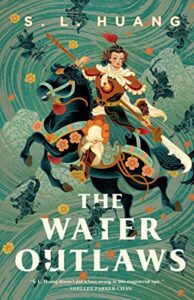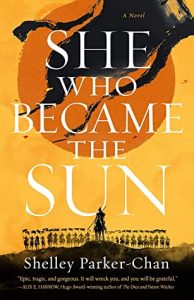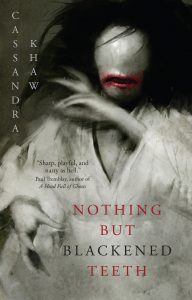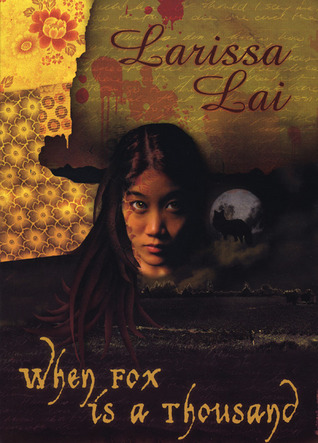When a book is described as being about ruthless bandits with unseemly femininity and ungovernable gender, let’s just say that I had little to no choice in devouring every single page of The Water Outlaws by S.L. Huang. It’s a queer martial arts political epic fantasy retelling of a Chinese classic called Water Margin. But don’t be intimidated by that long string of descriptors or the fact that it’s a retelling of Chinese literature! I didn’t know the source material going into this novel and I still enjoyed it thoroughly.
The Water Outlaws holds an impressively varied cast of characters, and the numerous POVs we’re given help to flesh out the world in which this story takes place. We primarily follow Lin Chong, an esteemed arms instructor lauded for her impeccable reputation, work ethic, and success in training the empire’s army. She came from lesser means and has worked her way up by sticking to the rules. We also follow Lu Junyi, a privileged socialite who dedicates herself to scholarly pursuits and arguing against unequal hierarchies and societal values.
When Lin Chong is wrongly accused and branded as a criminal, she finds herself with nowhere to go but to the mountains and marshes where a notorious group of bandits reside. The bandits, who steal from the rich to give to the poor, are beloved by the people but despised by the government. They offer her shelter, just as they do with every person that has been deemed lesser by society be it because of their social standing, sexual orientation, or gender identity. And this rattles Lin Chong’s long standing sense of duty, honor, and justice. Meanwhile, Lu Junyi is forced to confront how her privileged place in society has distracted her from the real dangers of corruption. She must reconsider her options when neither money nor social standing can save her.
Where this sapphic genderbent Robin-Hood-esque fantasy really shines for me is the diverse cast. Yes, it’s a story with a lot of politics and fighting, which makes it fun and fast to read, but the group of outlaws has incredible queer representation (we’ve got women kicking ass, trans folk kicking ass, nonbinary folk kicking ass—you get the point) is the heart of this novel. Everybody has their own backstory, their own goals and motivations. So even though there’s a lot of people to keep track of, it’s easy to distinguish them. But this was also the novel’s greatest weakness because with so many characters, you never seem to get enough time with each person to really delve deeper into them. It’s the trappings of a wide cast in a standalone fantasy, I suppose.
I love a book that has female rage and righteous anger (I was utterly fuming; you can see it in my reading activity notes on Goodreads), and this book has it in spades. It is a book with a lot of fighting and injustice, so there are many trigger and content warnings, some of which include violence, sexual assault, blood, and cannibalism.
The Water Outlaws reads a lot like a villain origin story for all of our main characters and that was the best part for me. Are they heroes, antiheroes, or villains in the end? You tell me.
Mims (she/her) is an Asian neurodivergent pansexual who is best known for being a longtime escapist, fanfic enthusiast, and a serial rereader of favorites. Too busy looking for new worlds to explore in fantasy novels and historical fiction, this book witch only has time for the weird and the absurd. But if you leave a trail of hurt/comfort, angst with a happy ending, and found family then you might just be able to catch her attention. You may find her haunting the following places: Her Blog, Goodreads, Instagram, and X (formerly Twitter).




